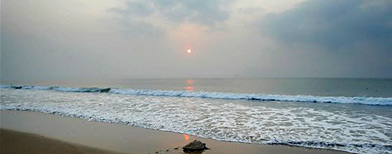As The World Turns
From Treehugger: 
In 1953, the Korean Demilitarized Zone (DMZ) was established to provide a buffer between the conflicting Northern and Southern nations--and today it is the most heavily militarized border in the world. But amid this icon of armed standoffs, in the narrow strip that divides the Korean Peninsula where no one is allowed, a highly diverse ecosystem has blossomed. And now, in a rare putting-aside of differences between the two countries squared off along the DMZ, the two Koreas will work together for the preservation of the corridor that has so long divided them.
Article continues: Korea's DMZ Will Soon Be Open For Ecotourism
Grape-gobbling baboons prefer pinot noir, chardonnay
Largely undeterred by electric fences, hundreds of wild baboons in South Africa's prized wine country are finding the vineyards of ripe, succulent grapes to be an "absolute bonanza," said Justin O'Riain of the University of Cape Town.
Private security guards shot and killed a Somali pirate during an attack on a merchant ship off the coast of East Africa in what is believed to be the first such killing by armed contractors, the EU Naval Force spokesman said Wednesday.
China begins blocking Google's uncensored HK content
As expected, China has fired back at Google in the company's attempt to redirect users from Google.cn to its uncensored Hong Kong site. Not only has the country replied with a fiery retort, it's begun blocking some access to Google.com.hk from mainland China.
Well there goes our China readers again

Island in dispute disappears into the sea
For nearly 30 years, India and Bangladesh have argued over control of a tiny rock isle.
Also:
Google's Corporate Site Hacked, Displays Chinese
Google was hacked on Wednesday morning, in what appears to be an obvious reprisal from their recent move of redirecting mainland Chinese users to uncensored search results from their Hong Kong site.
Anglo-Saxon treasure to remain in region where discovered
It's not that I don't love seeing the big museums with their impressive collections, but this is really a nice ending to a great story. The amateur metal detector was scanning farm land and found the historic treasure in the British Midlands and fortunately, it will stay thanks to donors as well as help from the British Museum. It's great to see such a treasure in smaller museums in smaller cities. This is a great opportunity for the host cities to generate more visitors.A grant of £1,285,000 from the National Heritage Memorial Fund (NHMF) will keep the glittering treasures of the Staffordshire hoard, the most spectacular heap of Anglo-Saxon gold ever found, in the region where an amateur metal detector found it last summer after it spent 1,300 years buried in a nondescript field.
The grant goes to Birmingham and Stoke-on-Trent museums, which will share the treasure, having raised the £3.3m necessary to pay Terry Herbert, who found the gold, and farmer Fred Johnson, the owner of the field where it was discovered.
Unusually for the fund, when the trustees met today there was no argument about the extraordinary quality of the hoard, or the merits of making the grant. Dame Jenny Abramsky, chair of the NHMF, said: "The Staffordshire hoard is an extraordinary heritage treasure. It is exactly the sort of thing the National Heritage Memorial Fund was set up to save, stepping in as the 'fund of last resort' when our national heritage is at risk, as a fitting memorial to those who have given their lives in the service of our nation. We're delighted, in our 30th anniversary year, to be able to make sure it stays just where it belongs, providing rare insights into one of the more mysterious periods of our history."

No comments:
Post a Comment